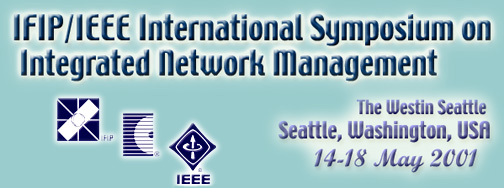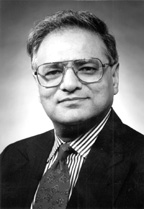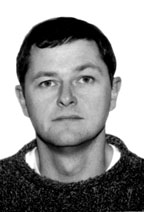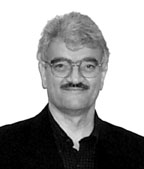
DISTINGUISHED
EXPERTS
PANEL
Advanced Services in Converged Networks - Are
they Really Manageable?
The explosive growth of Internet and telecommunication
services, fast proliferation of advanced network devices and integration
of different technologies and applications in a rather complex network
have created a unique challenge for the network management community.
New ways of strategic thinking must be incorporated in future management
products and services to ensure a smooth transition towards the
future networked society. Enormous change in the telecommunications
industry is being driven by the convergence of the traditional Public
Switched Telephone Network (PSTN) with the Internet. With this change,
we are also seeing the convergence of data services with voice and
perhaps ultimately with video and other rich services. Not surprisingly,
increased complexity is attendant to these changes, and this complexity
implies new and daunting challenges for the management and operations
community. Will the network management and Operational Support Systems
(OSS) be able to keep pace as the next generation services are rolled
out? What are the long-term prospects for comprehensive management
of these functionally expansive telecommunication systems? What
might the consequences be if management and operational systems
were to remain fragmented and isolated? How great is the risk if
the converged networks end up in a brittle network, due to limitations
of their management systems? What needs be done to keep the Converged
Network manageable? Are the management issues getting the needed
attention? These are some key questions that will be addressed.
- Many networks today are constructed from
some combination of DWDM, SONET, ATM, and IP. Peering across the
layers is already difficult. Will integration of voice and advanced
services exacerbate this problem?
- Traditional PSTN voice and Voice over
IP (VoIP) will not only coexist Š they will likely need to interoperate
extensively! This will potentially introduce not only complexity,
but also significant scaling issues.
- SNMP-based management in the Internet
world has succeeded brilliantly at the Element Management Level
(EML), and on the Fault and Performance aspects of FCAPS. How
readily can existing Internet management methodologies be extended,
or new methodologies be developed, to support a broader range
of management functions? How quickly will tools emerge to manage
comprehensively at the Network Management Level (NML) or Service
Management Level (SML)?
- There has been much interest in recent
years in policy-based management of Internet functions, essentially
as a means of moving the provisioning of DiffServ, MPLS and IPSEC
services to the NML or possibly the SML. What are the prospects
for these efforts in terms of standardization, implementation
and deployment?
- What new functions might be needed at
the Business Management Level (BML)?
Organizer:
|
 |
Shri K. Goyal,
Director, Technical
Programs, GTE LABS, USA
Dr. Shri K. Goyal is Director,
Technology Program in Operations Systems Technologies of Verizon
Laboratories in Waltham, Massachusettes. He has been with
GTE (now Verizon) for over twenty-five years in various technical
leadership and management capacities. He has initiated many
successful programs in wireline/wireless, Service and Network
Management. His main contributions have been in defining and
managing strategic programs for Intelligent Operations Support
(OSS) systems development. Many of the Systems devloped are
currently in use in GRE.
Dr. Goyal has a Ph.D. in Electricial
Engineering from North Carolina State University in Raleigh.
He has published extensively. He serves on the advisory board
for IM and NOMS and was Technical Program Chair for NOMS '94
and General Co-Chair for NOMS '96. He was CNOM Chair 1996-1998
and the Chair of Enterprise Networking committee 1998-2000.
He holds a U.S. patent and two patents in India. He is a member
of AAAI and an IEEE Fellow.
|
Moderator:
|
 |
Scott
Marcus,
Chief Technology Officer (CTO), Genuity Inc., USA
Mr. Marcus is the Chief Technology
Officer for Genuity Inc. (formerly GTE Internetworking). Genuity
offers a full spectrum of data and voice/data communication
services, and is one of the largest Internet backbones and
web hosting providers in the world.
Mr. Marcus specializes in the technologies
and economics of internetworking transmission systems. When
GTE acquired the former BBN Corp., he led the engineering
design teams that created the initial design for GenuityÕs
wide area data network. This network supports SONET/DWDM,
TDM, ATM, Frame Relay, Internet and voice/VoIP services. He
has contributed to the architecture and design of large internetworking
systems for commercial service providers, carriers, corporate
customers, and the U.S. government, as well as GenuityÕs Internet
services network and the dial-up network that Genuity provides
for America OnLine.
Mr. Marcus has served in a wide variety
of roles at Genuity and its predecessor organizations, including
systems architecture and engineering, capacity planning, legal
and regulatory advocacy, sales, business development, consulting,
and product architecture and design. He frequently speaks
at conferences and symposia, is a member of the Board of Trustees
of the American Registry of Internet Numbers (ARIN), and is
Vice Chair of the Committee on Network Operation and Management
(CNOM) of the Institute of Electrical and Electronics Engineers
(IEEE).
Prior to joining Genuity in March,
1990, Mr. Marcus managed communications software development
teams for Nixdorf Computer in Santa Clara, California, and
in Munich, Germany. From 1980 to 1985, he was a technical
founder and the Director of Software Development for Spartacus
Computers, a firm that developed the first commercial TCP/IP/Ethernet
solution for IBM mainframe computers.
Mr. Marcus received his M.A. at Columbia
University School of Engineering, 1980 and his B.A. in Political
Science at City College of New York (CUNY), 1972.
|
Participants:
|
 |
Zbigniew
Opalka, VP
and CTO, Axiowave Networks, USA
Mr. Opalka has more than 20 years of
experience in the architecture, design and development of
state-of-the-art networking equipment and embedded systems
and has several patents in these areas.
Prior to Axiowave, he was a founding
member and Senior Vice President of Engineering of Nexabit
Networks (acquired by Lucent Technologies in July 1999). He
subsequently served as Vice President of IP products at Lucent.
Nexabit Networks focused on the development of Terabit routers.
Prior to Nexabit, Mr. Opalka was the
VP of Engineering at Agile Networks. This was a startup whose
business focus was networking based on automated VLAN and
ATM/Ethernet technology. He was responsible for architecting
and developing the ATM routing software based on the OSPF
(Open Shortest Path First) protocol that was responsible for
automatically creating VLANs based on automatic detection
of IP network addresses. Agile was acquired by Lucent in the
fall of 1997.
Before Agile Networks, Mr. Opalka spent
many years at BBN Communications, the "birthplace" of the
Internet. He was responsible for software development for
Routers making up the backbone of the DARPA-sponsored Internet.
This was one of the earliest router networks ever deployed.
During this time he also managed the development of TACACS,
a distributed network access control system on the ARPANET.He
has also held various technical positions at General Electric,
MITRE and Fibronics.
He holds a bachelor's and master's
degree in Mathematics from Syracuse University.
|
 |
Tony
Confrey, Director,
Sonus Networks, USA
Tony Confrey is Director of Management
Software Development at Sonus Networks, a leading provider
of voice infrastructure solutions for the new public network.
In this role he and his team are working with internal architects
and early adopter customers to define and develop the tools
required to manage converged IP-PSTN networks and services.
Prior to Sonus, Tony spent eight years
performing research and development in the areas of advanced
network management and operational support systems at GTE
Labs. As leader of the Network and Service Management department
he developed and deployed numerous large systems into production
both nationally and internationally. These include the state
of the art web-based system that manages GTEÕs wireless and
wireline networks, GTEÕs open market transition gateway, a
secure CORBA customer management gateway and a broadband integrated
element management system.
Tony has also worked on intelligent
systems for manufacturing automation at IntelliCorp and expert
systems in the financial area at DECÕs European Research Center.
He has a MS in Computer Science from Stanford University and
a BSc in Engineering from Trinity College, Dublin.
|
 |
Richard
Lau, Executive
Director and Chief Scientist, Global Service Management Research,
Telcordia Technologies, USA
Dr. Richard Lau is Executive Director
and Chief Scientist of Global Service Management department
in Applied Research of Telcordia Technologies. His current
research areas include the following:
- Service Level Agreement for Next
Generation Networks
- Quality of service, policy, and
congestion control for voice over IP
- Planning of VPN and MPLS networks
- Operation Support Systems for 3G/GPRS
and IP wireless/mobility networks
- Monitoring and anomaly analysis
for IP networks
- ADSL loop qualification and assurance
- Advanced service creation
Dr. Lau received the B.S., M.S., and
Ph.D. degrees in electrical engineering from the University
of Pennsylvania, in 1983, 1984, and 1987, respectively.
In 1985, he joined the Network Transport
Requirement division of Bellcore as a member of technical
staff and worked on network architectures and system issues
of SONET and ATM. Since 1989, he has been with the Video Systems
Signal Processing Research department, working on HDTV, ATM,
and cable modem networks. In 1993, he became a director and
led a group performing research on broadband access networks
and operations. In 1999, he became chief scientist specializing
in technology and strategic direction for next generation
IP and wireless networks. Recent, he became executive director
of a department focusing on global service management.
Dr. Lau is a senior member of the IEEE;
he holds 3 US patents related to high-speed networking and
has 3 patents pending in the area of IP VPN. He received the
New Jersey Inventors of the year award in 1997 for his pioneering
work on SONET self-healing ring networks. In 1998 he received
the Telcordia individual CEO award for his long-term contribution
to broadband technologies.
|
 |
Dr.
Jeff Case, Founder
and Chief Technical Officer, SNMP Research, Inc., USA
Dr. Jeffrey D. Case is the Founder
and Chief Technical Officer at SNMP Research, Inc. He leads
SNMP Research's development of network system, and application
management products based on the Simple Network Management
Protocol, related standards, and Web technologies. In the
20th anniversary issue of Data Com-munications magazine, Case
was named as one of the twenty most influential people in
networking. He is the author or coauthor of many standards
for Internet management, including SNMP version 1, SNMP version
2, SNMP version 3, and related specifications.
Case formerly served as a computer
center adminstrator and Martin Marietta Professor of Computer
Science at the University of Tennessee in Knoxville, and previously
was a computer center administrator and Associate Professor
of Electrical Engineering Technology at Purdue University
in Indiana.
Case continues to serve as Adjunct
Professor of Computer Science at the University of Tennessee.
Dr. Case received the Ph.D. degree from the University of
Illinois.
|
 |
Dr.
Salah, Aidarous
Director, NEC, USA
Salah Aidarous received his Ph.D. degree
in Electrical Engineering from Louvain University, Belgium,in
1976. From 1976 to 1985, he held several academic positions
teaching and doing research in expert systems, digital mobile
radio, and CATV. He has published over 100 papers. In 1985,
he joined Nortel working on introduction of new technologies
in transport and switching networks, standards for interoperability,
and network management. In 1997, he joined NEC where he is
the director of product planning working on managemant of
3G wireless and IP-based networks.
Salah is Senior Editor of Network Magazine,
ComSoc Editor for Internet Computing Magazine, and member
of the JSAC Editorial Advisory Board. He is co-editor/author
of "Network Management Into the 21st Century", "Telecommunications
Network Management: Technology and Implementation", and co-editor
of the IEEE Press Series on Network Management. He chairs
the Technical Committee on Network Operations and Management
(CNOM), and is a ComSoc Distinguished Lecturer.
|
|









